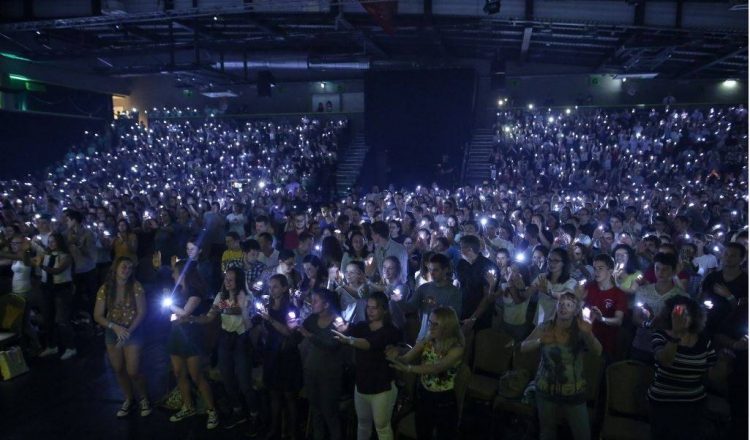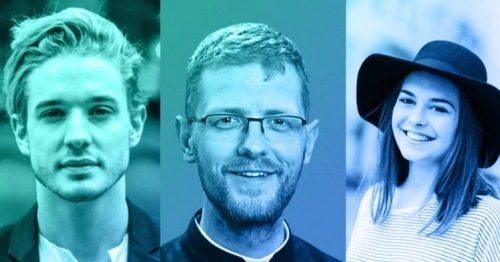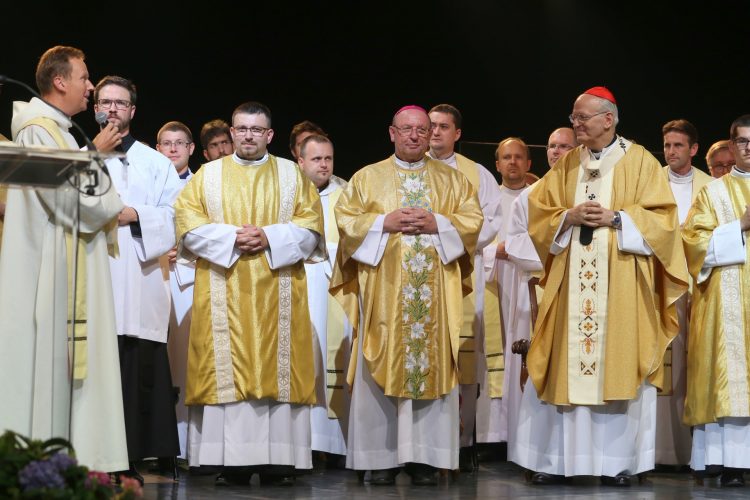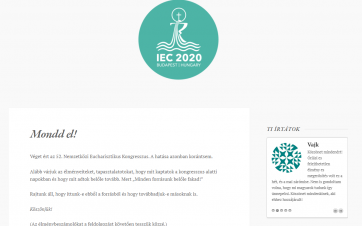It is dark in the conference hall of the sports centre in Budapest, the LED finger lights are glowing like fireflies. There is adoration you can hear the music and the crowd is singing. Young people, mostly high school students, those whom we mostly miss from the everyday life of the Church. They came from everywhere from the country, and even from outside the borders, more than two thousand.
The walls are covered in black curtains in the hall done in a minimalist style. The visuals are of high quality, the lights and sounds add up to the deepening of that rich content, to which - a meeting with Jesus - the young are called as a preparation to the IEC. After the first part - which consisted of glorification, podium talks and a lecture - the young celebrated the Holy Mass with His Eminence, Péter Card. Erdő, and the final act of the evening was an adoration.
The testimony was held by Csenge Gersei, who is the blogger of the Bella Girl Magazine, and was 800 followers on Instagram. A few years ago, the now 19 years old girl had a battle with anorexia. Today she considers her mission to helps those girls, who are in similar situation. She grew up in a religious, big family, and that is how she got to the camp "Word of Life", which defined her life. "I converted and accepted Jesus as my personal Saviour." Her turn towards Jesus helped her to establish a healthy self-image. She described the psychical background of those, who suffer from anorexia, in which the basic feeling is hatred, impotence and the presumption of being hated. The story of her conversion is also the way of healing. She has experienced how big power it has, to be called by God. She realised, that the way of Jesus requires decisions every day. Her entire being was transformed the personal and accepting love experienced in Jesus, and she believes it to be her task today to bear witness to it. Her tool is the social media - the posts, the vlog. Her aim is to have and "aesthetic, trustworthy and honest" site. As a blogger, she is involved with the Bella Girl Magazin (first issure this July), which is Hungary's only magazine for girls, which is not filled with "tabloid-themes and diet-ideas, but it is about values, beauty and the truth" - as the editors declared.
Kornél Fábry shared stories from the life of his own and of his friends which showed what the faith means in someone's life, how he experienced the love of God. The Secretary General of the IEC spoke about their 11-part vlog being made now, explaining the parts of the Holy Mass. Kornél Fábry encouraged us: "You are playing in the winning team, have courage to confess your faith. Upload a selfie to Instagram, proving that you were here. This is also a testimony."
After the break the first guest was Miklós H. Vecsei. "What would we fear for, what would we live for, if not for a dream" - the whole audience sang the song of the band Pál utcai fiúk. The honest speech of the young actor brought up vivid feelings in a lot of people. "I am a searching man, full of doubts. I stumble all the time, many times I mess things up." He told us, that for him the decisive revelation was, that the man as a Christian needs constant self-reflection, and also silence, to understand the other side of the world. "I refuse the Sunday/Sofa-Christians, and until I am unable to bend down to a homeless and help them to raise to their feet, I cannot judge others" - he said when tried to explain, what it means for him that Catholicism is the field of deeds. According to the popular actor the problem is, that today in the world they are trying to give us answers about everything. Opposed to this, the good art rather asks questions, and so the viewer, the audience has to re-phrase the answer. Empathy is a great help in this. In theatres time can stop, and the man can step out of the everyday' s rat race and feel: I am here, I am present, I am with you, I am in a community.
The priest-blogger, András Hodász brought up an evergreen subject: How can we be happy? He put a great emphasis that a lot of people live the Catholic faith as a collection of rules and regulations, of which we are obliged to obey. From another point of view, he quoted from the Bible: "Blessed are those, who live by the commandments of God", and called our attention that we are those, to whom God revealed the secret, to whom God showed the way of life. He directed the attention of the happiness-pursuers to the eight beatitudes. He confronted the "receipt" of these sayings with the ways offered by our age. In his lecture filled with humour he confronted the logic of the world and of the Gospels. The world believes to find happiness in the intensity of sensations and in maximizing of the pleasantness, opposed to the Gospels way - in loving our neighbours. The world says: achieve what you want; the Gospel: give yourself to the others. The world suggests that we only live once and let our desires free, but the Gospels ask you to be in command of your desires.
Through the eye of the world, the beatitudes may seem foolish. From the viewpoint of Fr. András, their completely different came to light. "Blessed are the poor in spirit" - blessed are those, whose heart is filled with only one thing, who can concentrate on only one thing, while the world tries to direct us towards being fragmented. How can be someone happy, who is sad? - he asked the question and showed us, that those, who are not afraid of pain, can be happy, because they know that it is also a part of life. He recalled his life as a boy-scout, which taught him, that the real, lasting experience is, for what one strives, when one can carry the cross for the others.













